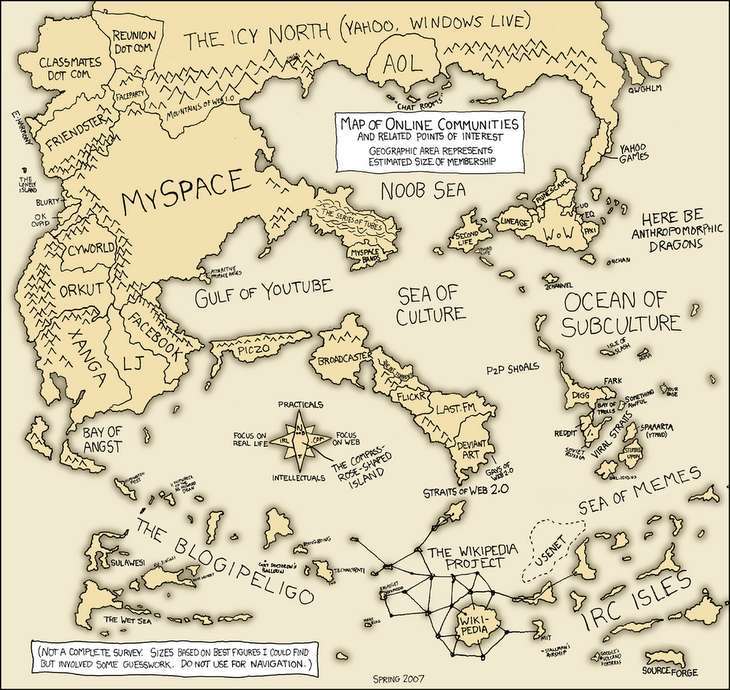The article examines the widely dispersed literature on trust with regard to information technologies. Trust is considered a crucial element with regard to social capital, and exists on four levels: the individual (psychological), the interpersonal (one to another), the relational (social glue), and the societal (functioning). The authors put forth a unified definition of trust as "the willingness to rely on a specific other, based on confidence that one's trust will lead to positive outcomes (3)."
When an individual possesses uncertainty or vulnerability in a particular domain, she may seek a dependent relationship with that which one is confident can fulfill that particular need, and this often entails risk on the part of the vulnerable individual. Systems trust (and here we bring the Internet into play) necessitates the establishment of social norms shared by other trusting individuals.
Trustworthiness is defined along four dimensions: competence and credibility, positive intentions, ethics, and predictability/consistency.
There are multiple processes invoked in the development of trust:
-prediction based on past behavior.
-intentionality of the trustee.
-emotional bonding and reciprocity of trust.
-reputation or institutional trust established through the trust of others.
-identification with the trustee (shared goals/values)
Four domains of trust are important in virtual environments:
1. Trustworthiness of information on the Internet.
-Users in need of information place themselves at risk for potential inaccuracy of information viewed. Factors at work include accuracy, bias, methodology, stability (of website address, currency), and validity.
2. Trustworthiness of the information/computing systems themselves.
-This includes interpersonal trust in one's own system as well as societal trust in network structures. One's emotional attitude, or technological bias, toward technology (technophilia/technophobia) is a crucial factor.
3. Trustworthiness of the economic stability of e-commerce.
-Both the buyer and the seller take risks. Reputation hinders on offline reputation and/or online ratings.
4. Trustworthiness of the individuals with whom one interacts in virtual environments.
-Motivations include information, friendship, or simply entertainment, and the truster has the authority to sever the relationship in case of fraudulent identity, abuse, or harassment. One's propensity to trust in this situation is highly dependent on one's technological bias, disposition, referrals, and the context of the relationship.
Computer technology challenges traditional notions of personhood, as machines increasingly take on roles and duties once assigned to people. Thus, it is apparent that trust plays a role in the relationship between human and computer in much the same way as in interpersonal relationships.
---
Social capital will be a central issue of discussion in my ensuing ethnography, and trust (as well as reciprocity and shared values and norms) is a crucial element.
MySpace: Little trust amongst generations outside the MySpace generation (today's teenagers), however a great deal of trust within that generation due to established cultural norms of participation in the community. Trust on MySpace is diminished by the proliferation of fraudulant identities and predatorial behavior, the finicky nature of the site, censorship, and the popular reputation I have just summated.
Facebook: High degree of trust in other users in one's network, who are usually preexisting relationships. However, growing wariness in the corporation itself due to the enormous amount of data that is collected and recorded and legal reprecussions to naive assumptions of privacy. Its quickly evolving nature, as well as its mass popularization (thus losing its niche identity) have led many to become suspicious of the intentions of the site.
Tribe: Very high degree of trust due to Tribe's subcultural history (as evidenced by its enormous popularity in the San Francisco Bay area). A haven for free speech, Tribe is also locally-based. Furthermore, many of Tribe's users possess shared cultural and social values (such as neotribalism). Users form tribes that often extend to the offline world, and vice versa.
SoundClick: Very high degree of trust, though few strong ties. What ties do exist are based around common interests (such as music genre or production tools) as well as reputation (established through rankings, popularity, degree of involvement on the site). SoundClick's niche audience authenticates the site, gives it legitimacy, and its users are able to share information with disparate others interested in the same thing (shared values and goals... globalizing potential).
Subscribe to:
Post Comments (Atom)






No comments:
Post a Comment